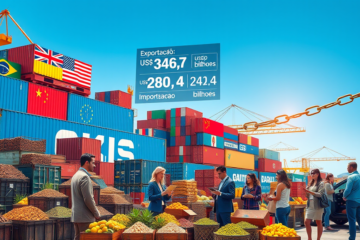Trade Deficit and Additional Tariffs in Brazil
Additional Fees represent a growing concern in trade relations between Brazil and the United States.
In this article, we will explore Brazil's trade deficit with the US and how the imposition of additional tariffs could impact these relations.
We will also discuss the context of tariffs, the shift in global trade that favors bilateral negotiations, and the recent announcement of a 10% tariff for BRICS-aligned countries.
In addition, we will analyze the role of the BRICS group, composed of countries with a significant GDP, in promoting financial and trade cooperation among its members.
Brazil-US Trade Deficit and Risk of Additional Tariffs
O trade deficit that Brazil presents in relation to the United States reflects an economic scenario where imports exceed exports, making the country vulnerable to changes in trade policies.
As pointed out in recent data, the deficit has been increasing, generating concern about Brazil's ability to sustain this negative balance.
The imposition of additional tariffs by the US government could make this situation even worse, increasing bilateral tensions.
These extra tariffs would represent an increase in the cost of Brazilian products, reducing their competitiveness in the US market and affecting the volume of exports.
Not only that would amplify the deficit, but could also lead investors to reevaluate their interests in Brazil.
A reduction of investment flows would further compromise the potential for economic growth, making it even more essential to seek negotiated solutions so that such trade barriers do not materialize.
Debate on Tariffs and Transforming Global Trade
The debate on international tariffs has gained prominence in trade relations, especially with the growing economic interdependence between countries.
Tariffs are seen as a tool to protect and promote local industry, but they can also cause trade tensions and affect multilateral agreements.
In the Brazilian context, the recent imposition of tariffs by the United States highlights the need for bilateral negotiations that can strengthen Brazil's position in global trade.
Bilateral Negotiations in Focus
Global economies seek constants reciprocal advantages through bilateral negotiations, and Brazil has adjusted its strategies to stand out in this scenario.
Brazil recently signed significant agreements with China, strengthening ties in trade and innovation, as reported by Exam.
Each negotiation aims to expand the market and strengthen politics, however, these partnerships are not without challenges.
For example, cooperation with China may face local regulatory barriers.
Furthermore, the tariff announced by the United States complicates things even further strategic business relations.
Brazil therefore needs to balance its relations to avoid overlaps that lead to financial and political risks.
Trust in diplomacy and the search for new markets are essential to minimize adverse effects and optimize sustainable development in the long term.
10% Tariff and BRICS Expansion
The recent imposition of a 10% tariff on countries that choose to align with BRICS policies, as highlighted by CNN Brazil, represents a significant challenge for international trade.
This move comes at a time of remarkable growth for BRICS, which now encompasses 11 members, with a combined GDP of US$ 24.7 trillion.
These figures highlight the economic relevance of the bloc, which promotes growing cooperation between nations such as Brazil, Russia, India, China and South Africa, as well as other members.
The following table details the economic participation of some of these countries within the BRICS group:
| Country | GDP (US$1.4 trillion) | Participation in BRICS trade |
|---|---|---|
| Brazil | 1.6 | 7% |
| China | 17.7 | 56% |
The expansion of BRICS and the strengthening of these economic ties underscore the potential impact that such tariffs could have on global trade flows.
Tariff increase could harm Brazil, especially considering the deficit it maintains with the United States, as discussed in analyses recently carried out in global macroeconomic scenarios.
In short, the issue of Additional Tariffs is fundamental to understanding the future of trade relations between Brazil and the United States, especially in light of new global trade dynamics.



0 Comments